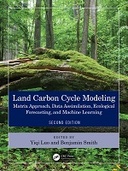Explore

Land Carbon Cycle Modeling
Yiqi Luo (editor) and Benjamin Smith (editor)
2024
0 Ungluers have
Faved this Work
Login to Fave
Carbon moves through the atmosphere, through the oceans, onto land, and into ecosystems. This cycling has a large effect on climate – changing geographic patterns of rainfall and the frequency of extreme weather – and is altered as the use of fossil fuels adds carbon to the cycle. The dynamics of this global carbon cycling are largely predicted over broad spatial scales and long periods of time by Earth system models. This book addresses the crucial question of how to assess, evaluate, and estimate the potential impact of the additional carbon to the land carbon cycle. The contributors describe a set of new approaches to land carbon cycle modeling for better exploring ecological questions regarding changes in carbon cycling; employing data assimilation techniques for model improvement; doing real- or near-time ecological forecasting for decision support; and combining newly available machine learning techniques with process-based models to improve prediction of the land carbon cycle under climate change. This new edition includes seven new chapters: machine learning and its applications to carbon cycle research (five chapters); principles underlying carbon dioxide removal from the atmosphere, contemporary active research and management issues (one chapter); and community infrastructure for ecological forecasting (one chapter).
Key Features
Helps readers understand, implement, and criticize land carbon cycle models
Offers a new theoretical framework to understand transient dynamics of the land carbon cycle
Describes a suite of modeling skills – matrix approach to represent land carbon, nitrogen, and phosphorus cycles; data assimilation and machine learning to improve parameterization; and workflow systems to facilitate ecological forecasting
Introduces a new set of techniques, such as semi-analytic spin-up (SASU), unified diagnostic system with a 1-3-5 scheme, traceability analysis, and benchmark analysis, and PROcess-guided machine learning and DAta-driven modeling (PRODA) for model evaluation and improvement
Reorganized from the first edition with seven new chapters added
Strives to balance theoretical considerations, technical details, and applications of ecosystem modeling for research, assessment, and crucial decision-making
This book is included in DOAB.
Why read this book? Have your say.
You must be logged in to comment.
Rights Information
Are you the author or publisher of this work? If so, you can claim it as yours by registering as an Unglue.it rights holder.Downloads
This work has been downloaded 51 times via unglue.it ebook links.
- 51 - pdf (CC BY-NC-ND) at Unglue.it.
Keywords
- Assessing Models
- Data Assimilation in Modeling
- ecosystem modeling
- thema EDItEUR::K Economics, Finance, Business and Management::KN Industry and industrial studies::KNA Agribusiness and primary industries
- thema EDItEUR::P Mathematics and Science::PS Biology, life sciences::PSP Hydrobiology::PSPF Freshwater biology
- thema EDItEUR::P Mathematics and Science::PS Biology, life sciences::PST Botany and plant sciences
- thema EDItEUR::P Mathematics and Science::PS Biology, life sciences::PSV Zoology and animal sciences
- types of models
Editions

